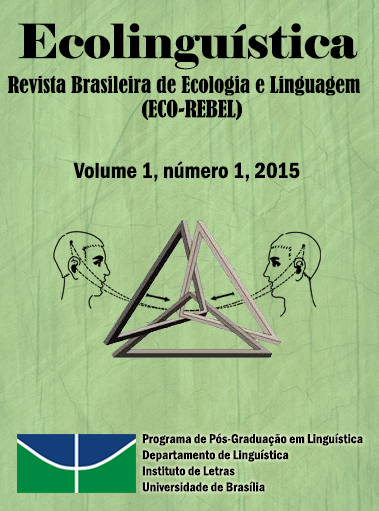Porque **Ecolinguística**
Keywords:
.  Key-Words: Language sciences; Holistic view; Ecolinguistics.Abstract
Originally published as Introduction to Makkai (1993), this article contains many of the ecolinguistic ideas of the author. Basically, it is an attempt at showing that there are other ways of doing linguistics beyond generative grammar, then called ‘generative transformational grammar’. Among these alternatives the following are mentioned, among others: Pike’s tagmemics, Sydney Lamb’s stratificational grammar and Halliday’s systemic-functional grammar. However, the alternative more in sync with the new view of the world brought about by modern science would be ecolinguistics, which is still in statu nascendi but can be a very interesting starting point for the study of language phenomena. However, it is proposed not as a paradigm for language sciences.
Downloads
References
ABERCROMBIE, D. Fifty years in phonetics. ForLing 5/2, 1980, p. 169-178.
ALGEO, J. Stratificational grammar. In Makkai; Lockwood (orgs.). Readings in Stratificational linguistics. Al.: The University of Alabama Press, 1973, p. 9-14.
ANTTILA, R. Revelation as linguistic revolution. The First LACUS Forum, 1974, p.171-176.
BEEKMAN, J., Callow, J. Translating the word of God. Grand Rapids, MI.: Zonderman, 1974.
BERGER, P. L.; Luckmann, T. The social construction of reality: A treatise in the sociology of knowledge. Londres: Penguin Press, 1967.
Dinneen, F. P. An introduction to general linguistics. New York: Holt, Rinehart & Winston, 1967.
HALLIDAY, M A K. Language as social semiotic. Londres: Edward Arnold, 1978.
HERRICK, E. M. Sociolinguistic variation: A formal approach. Ala.: The University ofAlabama Press, 1984.
KARÁCSONY, S. Magyar nyelvtan táraslélektani alapon (Hangarian grammar based on social interaction psychology). 1938.
KUHN, T. The structure of scientific revolutions. Chicago: The University of Chicago Press, 1962.
LUCKACS, J. Historical consciousness. New York: Harper & Row, 1968.
MAKKAI, A . Idiom structure in English. Tese de Doutorado, Yale University, 1965.
_______. A pragmo-ecological view of linguistic structure and language universals. Language sciences 27, 1973, p. 9-22.
_______. 1993. Ecolinguistics: ¿Toward a new **paradigm** for the science of language? Londres: Pinter Publishers, 1993.
NIDA, E. A. Towards a science of translating with special reference to principles and procedures involved in Bible translation. Leyden: Brill, 1974.
SHAUMYAN, S. K. Inaugural thought on the philosophy of linguistics, semiotics, and communication as it relates to a New Philosophy of Physics. LP 1, 1983, p. 28-31.
YNGVE, V. H.To be a scientist. The thirteenth LACUS Forum, 1986. p. 5-25.
Downloads
Published
How to Cite
Issue
Section
License
Authors who publish in this journal agree to the following terms:
Authors retain copyright and grant the journal the right of first publication. The work is simultaneously licensed under the Creative Commons Attribution License allowing the sharing of the work with acknowledgment of the authorship of the work and initial publication in this journal.
Authors are authorized to enter into additional contracts separately for non-exclusive distribution of the version of the work published in this journal (e.g., publishing in institutional repositories or as book chapters), with acknowledgment of authorship and initial publication in this journal.
Authors are allowed and encouraged to post and distribute their work online (e.g., in institutional repositories or on their personal page) at any point before or during the editorial process, as this can bring about productive revisions as well as increase impact.
Citation of published works (See The Effect of Free Access).



3.png)



